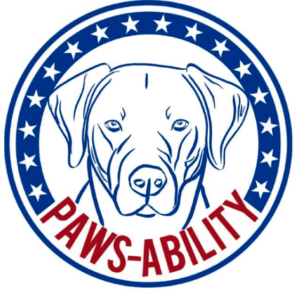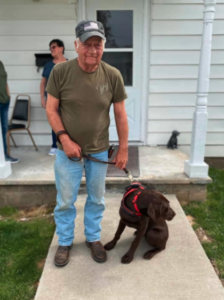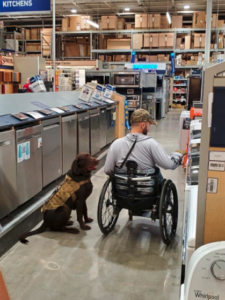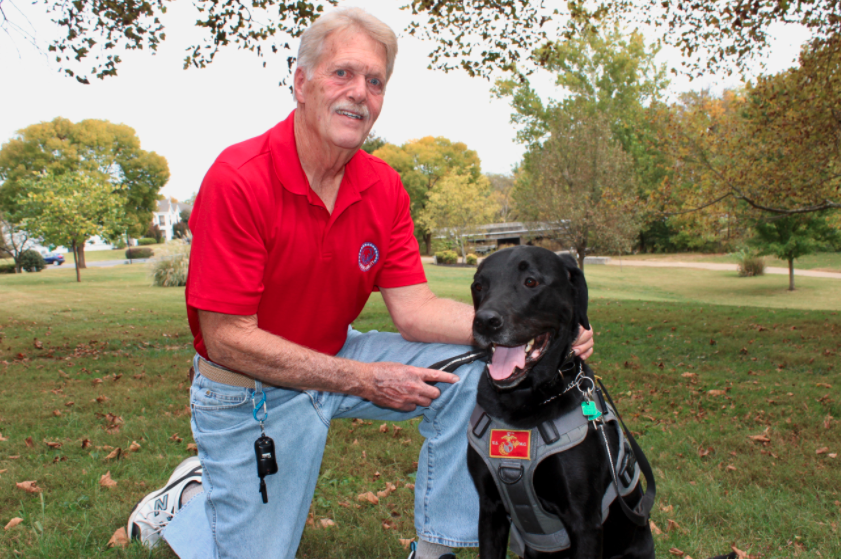St. Matthews-Based Nonprofit Organization Helps to Place Service Dogs
Writer / Annette Skaggs
Photography Provided
 If you are like many people, you like dogs. Perhaps you even love them. They are oftentimes playful souls who beg for food and belly rubs, and provide a great ear for when you are having a bad day. Dogs make marvelous pets, to be sure. Luckily, one day a smart human noticed how brilliant a dogs mind could be and that many of them have an innate ability to be helpers of some sort.
If you are like many people, you like dogs. Perhaps you even love them. They are oftentimes playful souls who beg for food and belly rubs, and provide a great ear for when you are having a bad day. Dogs make marvelous pets, to be sure. Luckily, one day a smart human noticed how brilliant a dogs mind could be and that many of them have an innate ability to be helpers of some sort.
For example, shepherds are so named because they assist in herding animals. Using dogs instincts, training began in order to teach these noble and adorable animals how to assist humans in their everyday lives, outside of being beloved pets.
Since the development of this manner of training, the services provided by these animals have changed the lives of millions of people (and the dogs themselves). Many of us are familiar with the ubiquitous seeing-eye dog, perhaps one of the most common of them all, but there are a multitude of other maladies and ailments that canines help with every day, from guidance to the ability to sniff out cancer. Trainers and scientists are still learning and unlocking new abilities of canines and other animals.
With industry leaders such as the International Guide Dog Federation, Dogs for the Deaf and Paws for a Cause, there is no lack of resources to attain one of these magnificently trained furballs. Numerous studies have found that veterans and first responders have benefitted greatly through attaining their respective animals, but what if money is a little tight and you find yourself needing the assistance of a good service dog? Insurance doesnt cover guide or assistance dogs, and acquiring a dog of this kind can cost upwards of $40,000. Not many families have that kind of money to put towards getting a support animal.
Enter Paws-Ability, Inc., a fairly new organization to the Louisville area that specializes in getting support dogs to our veterans, correctional officers and first responders, with minimal or even no money out of their pockets.
 The organization sprang from the minds of co-founders Jim Day and John Wells. Day, a Vietnam Army veteran who often has his dog Samson by his side, had been working with another organization that provides service dogs, but he felt that he could build a better program and one that, hopefully, would reach more people and dogs.
The organization sprang from the minds of co-founders Jim Day and John Wells. Day, a Vietnam Army veteran who often has his dog Samson by his side, had been working with another organization that provides service dogs, but he felt that he could build a better program and one that, hopefully, would reach more people and dogs.
Having Samson has allowed me to regain much of my lost freedoms, Day says. A service dog does not solve everything, but it does make life so much better.
It is that kind of impact that this organization seeks to achieve every day.
You may be asking, how did John Wells get involved, and become the face and prime contact for the organization? One could say that it was kismet or luck. More on that to come. Lets learn a little bit about Wells beforehand.
Wells grew up in St. Matthews, attending Waggener High School. Coming from a family heavily steeped in military service, including his father who served as a colonel in the Army for 34 years including reserves, Wells entered the Navy and served as a corpsman for the 1st Marine Division out of Key West, Florida. He was shipped to a naval base in Vietnam early on in his service.
When Wells was released from his military career, he came back to the states and began employment with Case Tractors in Wisconsin. While there he married and had a son. While working with Case he caught the entrepreneurial bug and began to franchise a string of convenience stores. Unfortunately for Wells, the stores didnt succeed, nor did his marriage.
Wells and his son then moved back to Louisville, moving into his childhood home, soon after his father passed away. Picking himself up, he began a career with a company in Fisherville, working on projects such as installing bleachers in gyms and stadiums. Always the tinkerer, he also had a side business repairing lawnmowers. After 20 years, Wells retired.
Upon his retirement, he began spending more time at the VFW Post 1170 in Middletown and the Vietnam Veterans of America post in Jeffersontown. Connecting with fellow veterans was good for Wells and allowed him to make new friends. Aside from these organizations, more time was spent volunteering at the VA Medical Center.
As time passed, Wells doctors suggested that he would probably benefit from the aid of a service or companion canine. Through some assistance with other agencies, he was paired up with a black Labrador named Johnny Cash. While Wells was more of a cat person, as his son, the last dog that he had was in his youth, when he held a morning and evening paper route.
Wells has had his canine companion for more than five years now, and cant imagine life without him. With his gentle demeanor and even sweeter face, Cash has been invaluable to his quality of life. While that is a gift in and of itself, Cash has become a magnificent ambassador for Paws-Ability, and a welcome visitor to the VA.
There are hardly words to describe the interaction between the patients at the VA and Cash, including the ward that houses some of our most medically fragile veterans, Wells says. The smiles and life that Cash brings to them is affirmation of the work that we are trying to accomplish with Paws-Ability. Unfortunately, due to the viral outbreak I dont get to bring Cash around like I used to.
Despite not being able to roam the halls of the hospital like in the past, Wells and Cash stay busy building Paws-Abilitys brand.
As the organization grows, so does Cashs celebrity, Wells says. Hes known as far away as Laynesville.
Like other dog assistance programs out there, Paws-Ability follows Americans with Disabilities Act regulations, which includes 150 hours of training time with a canine and a certificate of accomplishment. Luckily there have been some collaborations with other programs that help aid the training of the dogs and their human counterparts. In this area, the Luther Luckett Correctional Complex has a successful dog training program, and Cash is a shining graduate, but Paws-Ability utilizes the ADOPT (A Dog on Prison Turf) program at the womens prison in Madison, Indiana. Through this training, the dogs learn basic, essential service skills and behavior. The women eat, sleep and exercise with their assigned dogs 24 hours a day.
A commonly used breed is the chocolate lab, including the original five that a breeder gifted to Paws-Ability about a year ago when the organization first began. Shepherd, retriever and Pyrenees dogs are used too. It was once believed that service animals should begin training as puppies, but over the years behaviorists have said these dogs do better with learning retention when they are one or one and a half years old.
 As one can imagine, the cost of the canine and its training can get rather expensive. Wells shares that the range of cost can be anywhere from $3,500 to $70,000 per dog. If that doesnt make your jaw drop, consider the fact that insurance does not cover service animals.
As one can imagine, the cost of the canine and its training can get rather expensive. Wells shares that the range of cost can be anywhere from $3,500 to $70,000 per dog. If that doesnt make your jaw drop, consider the fact that insurance does not cover service animals.
While the raising of such funds is daunting enough, the demand for the animals is great and the application process can be arduous. Currently Paws-Ability has eight in their queue. Aside from the paper application that goes through the board, as well as an interview committee, there is a required home inspection. This process can take months, but if a dog is ready the placement can be a relatively quick one. Some owners have their own dogs trained to become certified service animals, and this can streamline the process.
When Paws-Ability first began, their coffers were rather modest, but Wells says the Veterans of Foreign Wars divisions in and around town helped to build the necessary seed money. Word of mouth is a great way to support their cause, and the recent Give for Good Louisville online giving day was fruitful.
We raised around $6,000, but we could certainly use more, Wells says. Weve donated 10 dogs since we began the program, and Id like to see those numbers double and triple in the next five years. When you give a dog to a person with a symptom like post-traumatic shock disease, more times than not that person becomes alive again, a complete 180 degree from what they were. It is in those moments that I know we are making a difference. Wed also like to advocate the benefits of service animals to more veterans and first responders.
When asked what Cashs training does for him, Wells doesnt shy away.
As Ive been diagnosed with Parkinsons, Cash can recognize anxiety and nightmares that I may have, and he knows how to comfort and alert me, he says. You can be sure I take care of him, keep up with all of his shots and vet visits, and see a pet nutritionist. At home when his service vest comes off, Cash instantly knows that he is off-duty and relaxes a little, but still knows to look out for me.
When looking Johnny Cash in the eyes and seeing the glow on Wells face, one cannot help but be compelled to assist the organization on their quest to connect these loving canine souls and individuals, who will love and learn from each other.
For more information about Paws-Ability, please go to pawsability.org.






